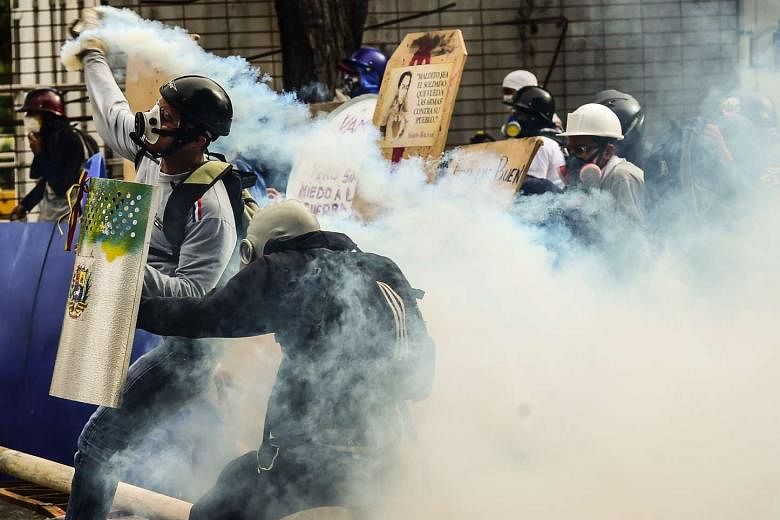CARACAS (AFP) - A nationwide strike has brought parts of Venezuela to a halt as the opposition ramped up its challenge to President Nicolas Maduro that has already seen four months of deadly street protests and threats of US economic sanctions.
Two young men were killed in separate demonstrations, according to prosecutors: a 24-year-old on the outskirts of Caracas and a 23-year-old in the city of Valencia. That brought the death toll since April to 99.
Thursday's (July 20) 24-hour stoppage affected areas of the capital and other regions, including the country's second-biggest city of Maracaibo, with businesses shuttered, public transport stalled and streets often deserted.
Opposition demonstrators clashed with riot police in parts of Caracas, and set a police booth on fire. There were several arrests.
Stones were also thrown at the headquarters of VTV state television.
"It doesn't matter losing a day's work if we're losing the country," said one striker, a 34-year-old owner of a small Caracas construction firm who only gave his first name, Omar.
"I'm joining the strike to rescue the little remaining for us, to increase pressure" on Maduro, he said.
By backing the opposition's "final offensive" against the president, company owners taking part risked government reprisals.
In pro-government parts of the capital, however, life went on as normal.
Some workers in public offices were reluctant to take part, scared it would cost them their jobs.
"If I don't go to work, they'll fire me," a 39-year-old public worker who gave her name as Carolina told AFP.
Maduro seized on the areas of normality to claim victory over the strikers, saying key sectors were "100 per cent" unaffected by the strike.
"The only ones who can bring this country to a halt are the Chavistas," he said, referring to pro-government supporters named after late president Hugo Chavez.
Maria Francis, a 53-year-old worker in the Caracas metro system, called it an "absurd strike."
The opposition, she said, "wants the United States to come in and take over the country." .
Maduro is under fire domestically and internationally over plans for a July 30 election of a citizens' body - a "Constituent Assembly" - to rewrite the constitution.
Critics see it as a power grab.
US President Donald Trump has warned of unspecified "swift economic actions" against Venezuela if the vote goes ahead.
Maduro has defiantly said the threat made him determined "more than ever" to see through the election.
Venezuela's economy is dependent on its oil exports. Around a third of its crude production of 1.9 million barrels a day goes to the United States.
The head of the state-run oil company PDVSA on Thursday told state television that the 24-hour strike had not affected its operations.
The opposition is feeling invigorated in its campaign against Maduro by an unofficial plebiscite it held last weekend in which 7.6 million Venezuelans - more than a third of the electorate - overwhelmingly cast ballots against the Constituent Assembly.
It is also buoyed by implicit support from abroad, including from Trump, the European Union, the Organization of American States and major Latin American nations.
Many of Venezuela's suffering businesses backed the strike. More than two-thirds have closed in the past decade, according to the FEDECAMARAS employers' association.
"This strike is an impulse shared by business owners and a famished and impoverished population against a government that is also broken but which controls the few resources of an oil country," said analyst Luis Vicente Leon of the Datanalisis polling firm.
Datanalisis surveys have shown that more than 70 per cent of Venezuelans reject Maduro's leadership.
But the president has brushed aside opposition moves to force him out. He can count on a loyal military, which has been given control of swaths of the economy.
With past efforts at dialogue failed, the opposition has turned to sustained street protests, as well as calling Thursday's strike.
Some in Maduro's camp have broken ranks, most prominently his attorney general, Luisa Ortega, who has branded the Constituent Assembly unconstitutional.
On Thursday, a senior Venezuelan diplomat at the United Nations, Isaias Medina, resigned.
"I cannot be part of a government that is systematically attacking protesters," and not respecting their right to demonstrate, Medina said in a video filmed at the United Nations.
Maduro has presented his Constituent Assembly as the only path to "peace" and prosperity. But he has not explained how the body or a new constitution would bring that about.
Venezuela's economy is expected to shrink by nine percent this year, said Asdrubal Oliveros of the consulting firm Ecoanalitica. Inflation is expected to top 700 per cent, according to the International Monetary Fund.

